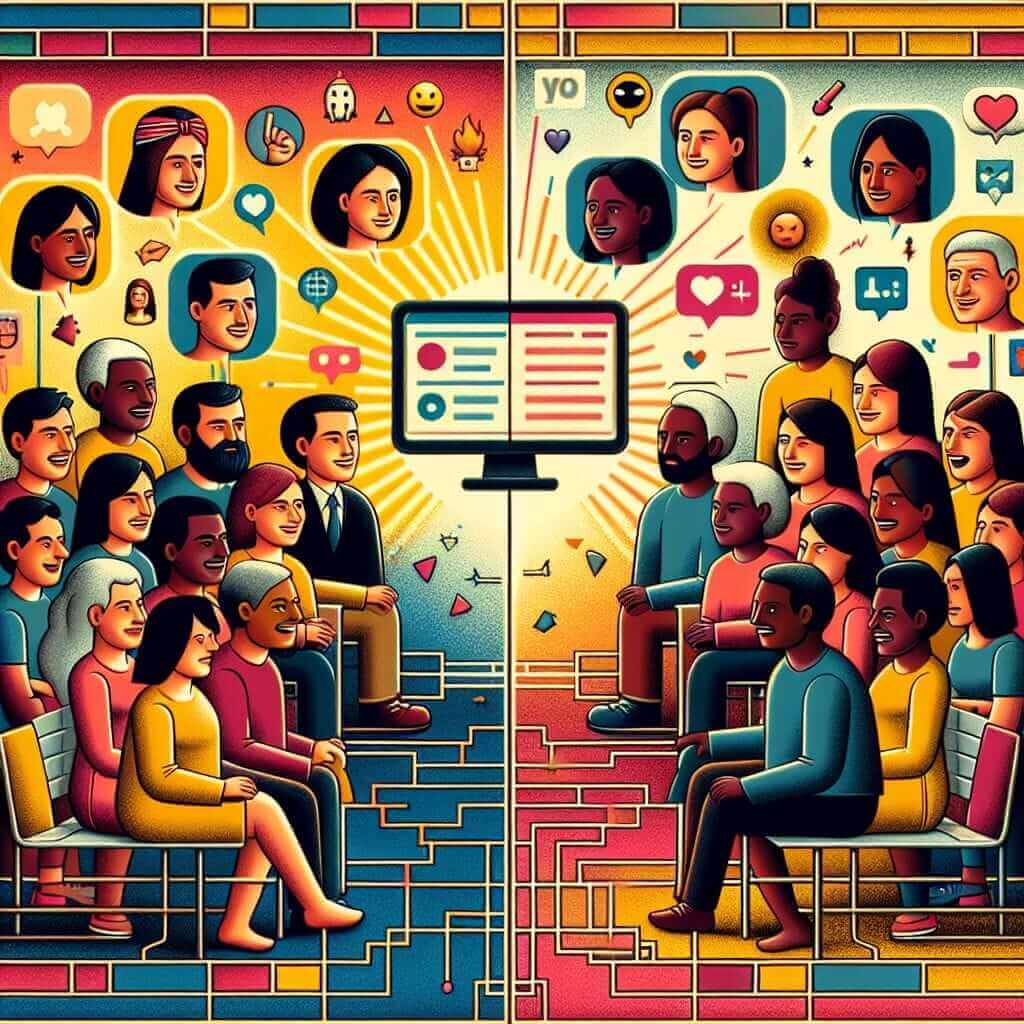Public discourse and social media are topics that often appear in IELTS Writing Task 2. Given the increasing influence of social media platforms on public opinion and societal norms, these themes are highly relevant and likely to be featured in future exams. Historically, topics such as “the impact of social media on public discourse” and “how mass media influences public opinion” have been prominent in IELTS exams. As we move forward, we anticipate these themes to remain significant due to their continuing relevance in today’s digital age. Below are three related essay prompts that have appeared in previous IELTS exams or are closely related:
- The impact of social media on public discourse and its effects on society.
- How social media platforms influence public opinion during elections.
- The role of mass media in raising public health awareness.
Essay Prompt
Given the high occurrence of social media-related topics, we will use the following prompt for our sample essay:
The impact of social media on public discourse has been profound, with both positive and negative effects on society. Discuss both views and give your opinion.
Analyzing the Essay Prompt
The presented essay asks you to discuss both the positive and negative impacts of social media on public discourse, and then provide your own opinion. To effectively address this prompt, consider the following steps:
- Introduction: Briefly define public discourse and introduce the influence of social media.
- Body Paragraph 1: Discuss the positive effects of social media on public discourse.
- Body Paragraph 2: Explore the negative impacts of social media on public discourse.
- Conclusion: Summarize the key points and state your own opinion.
Sample Essay
Introduction
Social media platforms such as Facebook, Twitter, and Instagram have revolutionized the way people communicate and exchange ideas, significantly impacting public discourse. While some argue that these platforms foster greater accessibility to information and diverse opinions, others believe they contribute to misinformation and societal polarization. This essay will explore both perspectives before presenting my own viewpoint.
Positive Effects of Social Media on Public Discourse
On one hand, social media has democratized information dissemination. Individuals now have the opportunity to voice their opinions and share ideas regardless of their social or economic status, thereby contributing to a more inclusive public dialogue. For instance, social media played a critical role in the Arab Spring by enabling activists to organize protests and spread their message worldwide. Moreover, platforms like Twitter and Facebook provide real-time updates and diverse viewpoints on current events, making it easier for people to stay informed and engaged.
Negative Impacts of Social Media on Public Discourse
Conversely, social media also has its downsides. The spread of misinformation is especially concerning, as false or misleading information can quickly gain traction and influence public opinion. Social media algorithms often prioritize sensationalist content, which can lead to an unbalanced view of issues and foster a culture of clickbait and misinformation. Additionally, the echo chamber effect, where individuals are exposed only to information that confirms their pre-existing beliefs, exacerbates societal polarization and hampers constructive dialogue.
Conclusion
In conclusion, social media has undeniably transformed public discourse, offering both significant advantages and disadvantages. While it fosters inclusivity and real-time information sharing, the spread of misinformation and societal polarization are serious concerns that need addressing. In my opinion, the benefits of social media can be maximized, and the drawbacks minimized, through responsible usage and the implementation of stricter controls on misinformation.
Word Count: 296

Tips for Writing About This Topic:
-
Vocabulary:
- Democratized (verb): /dɪˈmɒkrətaɪzd/ – to make something accessible to everyone.
- Misinformation (noun): /ˌmɪsɪnfəˈmeɪʃ(ə)n/ – false or inaccurate information.
- Sensationalist (adjective): /sɛnˈseɪʃənəlɪst/ – presenting information in a way that provokes public excitement.
- Echo Chamber (noun): /ˈɛkəʊ ˈʧeɪmbə/ – an environment where a person encounters only beliefs or opinions that coincide with their own.
- Polarization (noun): /ˌpoʊ.lər.əˈzeɪ.ʃən/ – division into two sharply contrasting groups.
-
Grammar:
- Use complex sentences to show a range of grammatical structures. Example: “While social media enables greater access to information, it also contributes to the spread of misinformation.”
- Utilize transitional phrases to ensure coherence. Example: “On one hand… Conversely…”
Conclusion
In summary, understanding the role of social media in public discourse is essential for tackling IELTS Writing Task 2 topics effectively. As demonstrated, social media offers numerous benefits, such as democratizing information, while also posing significant risks, including misinformation and polarization. Future exams are likely to continue focusing on these themes, so thorough preparation is key. Practice writing essays on similar topics to hone your skills and improve your performance.
For more related topics, you can explore articles on media bias and public opinion or the influence of social media during elections, which provide further context and examples.